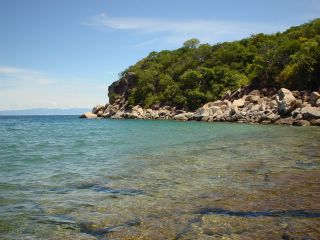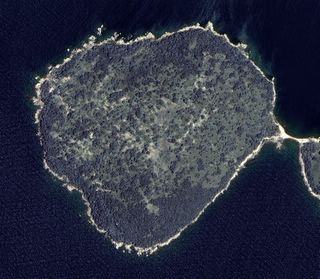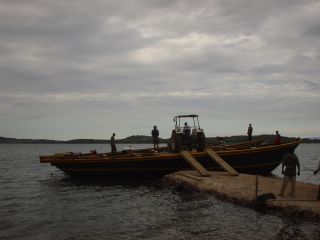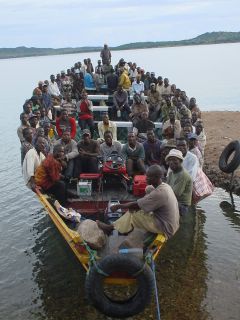

We have now completed our own Lodge on Lake Tanganyika. We offer a variety of Accommodation options and Adventure Activities. For more information please see us on www.laketanganyikaadventuresafaris.com






Now that we think about it, we were wondering where all the young cats and the 3 kittens had disappeared to. We thought that the spotted eagle owls must have killed them, but now we think that it was the leopard who has been slowly taking out the cats. There are now only 4 young cats left. Two are black, one is grey and one has black, white and brown markings. These are all very well camouflaged compared to the 2 white cats and kittens that have disappeared.
What is very worrying is the fact that we had planned to bring our 2 dogs, Madonna and Asterix and our 2 cats, Maverick and Phoebe to live with us while we are building the lodge. We had intended to continue camping with the Benedictine Monks on their land in Kipili and move over to the island once the staff quarters have been built, but it is now rather apparent that we are going to have to change our plans and move over to the island immediately and camp there with our animals until the staff rooms are completed. We are also going to have to be very careful about where our menagerie of new animals is put at night or the 7 chickens, 4 guinea fowl and 2 goats will also become a delicious snack for our new leopard friend.
But I seem to be getting ahead of myself here. I must go back to the beginning of our adventure here on the banks of
Chris has been hired by Tom and Belinda to build a lodge on an island on
We left Arusha on Tuesday 1 March and headed south to
The roads up to this stage had all been good tar roads and so we were able to average 80km an hour. From Tunduma the road became a dirt road that was bad in some places and appalling in others. We had not driven very far when we had our first puncture. One of the wheels of the trailer had deflated completely when we hit a stone. Thankfully it was still light and the sun had not yet set.
By half past 8 in the evening we had only managed to cover 90km and I was getting very tired. We had been on the road for 12 hours and I was ready for bed. Unfortunately there was no-where that we could stay. The few villages that we drove through were too small to offer any kind of guesthouse accommodation as they were mostly mud huts with grass roofs.
Chris decided to drive on in the hope that we would be able to find somewhere to stay. Just before midnight we came across some awful mud and managed to get the trailer well and truly stuck. It was not designed to be used off-road, especially laden with 2 tons of our worldly possessions. Luckily a truck, coming in the opposite direction, stopped and 3 men came over and helped us first dig the trailer wheels out and then push the trailer out of the thick mud. I really don’t know how we would have managed without them.
The next village that we came to was slightly larger than the previous villages and boasted a fuel station and 2 guesthouses. As luck would have it the guest houses were full and so there was nothing that we could do but continue on towards Sumbawanga. By half past 4 in the morning, both Chris and I were feeling nauseous because we were so tired. Chris pulled over as much as he could and we both slept upright in our seats for 2 and a half hours. I don’t think that I can ever remember being so tired before.
We finally arrived in Sumbawanga at half past nine the following morning, 13 and a half hours after leaving Tunduma. I cannot explain how thrilled we were to arrive in the dusty town of
We headed straight for the first fuel station and fixed our trailer tyre before heading to the Monrovian Conference Centre for a much needed shower, sleep and lunch. It is just as well that we did have our puncture fixed because we were to have another puncture along the road from Sumbawanga to Kipili.
After lunch in Sumbawanga we decided to drive on to Kipili. The road took us through a beautiful, forested escarpment and then down towards the lake. It seemed to go on and on and by half past 8 in the evening we were both wishing that we had spent the night in Sumbawanga rather than driving through to Kipili. That was when it all started to go wrong. About 6km from Kipili we got another puncture in the trailer. By this stage Chris was very tired and after changing the tire, he forgot to completely tighten the wheel nuts. We had not driven much further when we heard an awful noise and stopped the car to find the wheel hanging on by only 1 wheel nut.
As you can imagine, Chris was furious with himself. Luckily we managed to find one of the wheel nuts that had fallen off the loose wheel. We took another wheel nut off the other trailer wheel and so managed to move the trailer to the side of the road where we left it and drove to Kipili for help. We were only 3km from the Monastery in Kipili, our final destination. We just could not believe it. By the time Chris had managed to bolt the loose wheel onto the trailer and drive it to the Monastery, it was after 11 in the evening. What a trip from hell!
I have made several references to the Monastery where we are currently staying. Let me give you a little more insight into this. The Monastery is run by 3 Benedictine Monks; Brother Miti (the Monk in charge), Brother Damian and Brother Vincent. The Monastery as you would imagine it, with an Italian style building, is set up on a nearby hill, overlooking the
When we first arrived here, we set ourselves up in one of the Monk’s rooms that was being used as an office for the project. It was soon evident that this was not going to be big enough for us to sleep in, cook in and work in. So we spent a week clearing a quarter of an acre on the Monk’s land so that we could put up our tents.
Our home is in the form of 3 tents, a shower and a trailer. Chris and I stay in the largest tent which also has a front area, surrounded by mosquito net. This is our dining area. A second tent is the guest tent for any visitors and the third tent has been turned into an exercise tent. The shower is an open air shower which looks directly west, onto the mountains of the
When we arrived here, we soon realized that food was going to become a major problem. In other parts of
The huge boat, nicknamed “tumbo” (stomach), was delivered to Kipili on Sunday 14 March. This meant that Chris could go across to the
He was pleasantly surprised at the work ethic that the men here have. None of the men have ever done anything of this sort in the past, but what they lack in experience, they more than make up for in enthusiasm. They are also so happy and ready to laugh. It is wonderful to hear them singing as they work. One person will start to sing and in no time at all he will be joined by 3 or 4 others, all working in unison.
Work begins each day at 8am with a role call and equipment issues and then Chris takes them across to the
Chris has broken the men down into 6 teams of 12 and every week they compete against each other. The team spirit that this has encouraged is fantastic. Some of the teams have come up with their own names and so Team number 1 is now called: “Men of Work” and Team 2 is now called: “Solidarity”. We are also going to clear a football pitch for them in Kipili and on Saturday afternoons they will finish work a little early and will play football against each other.
Chris said that one of the most humbling experiences that he has ever had was when he paid the men for the first time. Most of the men had never earned a salary in their lives and just stared at the money, almost in disbelief. Some are not able to write and so they lick their index finger and mark the page with their fingerprint.
I don’t think that any of us will ever truly comprehend the full impact that we are having on the lives of this little village and the surrounding area. Not only are 72 people able to earn money for the first time in their lives, and in this way buy things and do things that they would probably never have been able to do had the project not started. But the ripple effect is enormous.
The Chairman of the Kipili village approached Brother Miti and asked him to please thank us for giving so many people jobs. He said that before the project had started, the village used to be full of drunkards. But every day, the men are working very hard and so at night they are too tired to stay up drinking the local brew, and so the village is quiet and everyone is very happy.
Although it is not our project and we are not really the ones paying these people, it is hard not to feel that we are contributing a great deal to so many people and for this we are very grateful.